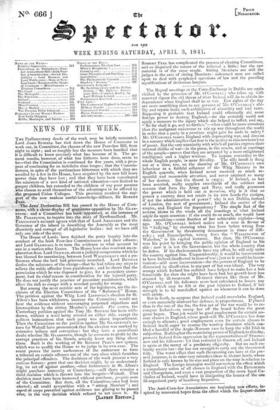The Repeal meetings at the Corn-Exchange in Dublin are again
vivified by the presence of Mr. O'CONNELL who takes up with
renewed vigour the old threat of what Ireland will do to obtain in-
dependence when England shall be at war. Few sights of the day are more mortifying than to see persons of Mr. O'CONNELL'S abi-
lity and repute make such exhibitions of absurdity and bad taste. Supposing it probable that Ireland could effectually aid some foreign power to destroy England,—for she certainly could not apply a measure to the injury which she helped to inflict, and say, " So far shall it go, and no further,"—what could be more atrocious than the malignant endeavour to stir up war throughout the world in order that a party in a province might gaits its ends in safety ?
Mr. O'Corixam. taunts England with deprecating war, and does so in a manner which implies that fear is the motive to this newborn love of peace. But the very unanimity with which all parties express their rational dislike of war—in the press, in the senate, and at meetings of the people—proves that they are actuated by a more enlightened intelligence and a higher wisdom. To impute cowardice to the whole English people, is mere frivolity. The silly insult is flung out at a time, too, on the showing of Mr. O'CONNELL'S own behaviour as a faithful adherent of the Whig Ministry in its English quarrels, when Ireland never received so much re- spectful and reasonable attention, and never attained so many of her desires. But the threat is crnpty. If Ireland, as has been asserted, really supplies two-thirds of the soldiers and seamen that form the Army and Navy, and really possesses the power which is held out in terrorem, why is it that so potent a country does not retain in its own hands the ensigns, if not the administration of power ? why is not Dublin, instead- of London, the seat of government ; Ireland the centre of the empire, and England the dependency ? The simple fact of the reverse blows to the winds all the boastings of what Ireland might do upon occasion : if she could do so much, she would have done something—sodie friction of her achievable exploits—long ago. Mr. O'ConNELL indeed makes out a case in favour of his " bullying," by showing what has been before wrung from the Government by threatening demeanour in times of diffi- culty ; and Emancipation, wrung from the " WELLINGTON of Waterloo," is his capital instance. But then, Mr. O'CONNELL won his point by bringing the public opinion of England to his side : now it is not the Government, but the whole country that he defies. If his rhodomontade have any effect, he will only unite the country against him. Unquestionably, it would be inconvenient to have Ireland disaffected in time of war ; just as it would be incon- venient—still more inconvenient—for the powers of England to be distracted by disaffection in any part of her own island. The very wrongs which Ireland has suffered have helped to make her a less formidable foe than she might have been had her growth been less stunted by ill-treatment. Ill-timed threats like those of Mr. O'CoxxELL and his followers seem best calculated to lessen any regret which may be felt at the past injuries to Ireland, if her strength is to be marshalled against us whenever it can be done with safety. But in truth, to suppose that Ireland could overwhelm England, or even materially obstruct her defence, is preposterous. If placed thus in the van of the foe, the first act of the war would be to re- conquer Ireland—to sweep her off the board before the great game began. That job would be good employment for certain un- easy classes in England, whose good-will Mr. O'CONNELL has done enough to alienate ; good employment even for certain classes in Ireland itself, eager to resume the warring dominion which ena- bled a handful of the Anglo-Norman race to keep the wild Irish in subjection. Nothing but the restraining power of England, to this day, protects Ireland from oppression by the representatives of STRONG.. now and his followers : let that restraint be thrown off, and Ireland is again at the mercy of a predatory oligarchy. But no such ca- lamity awaits her : she has not strength to carry out the threatened folly. The worst effect that such threatening can have at the pre- sent juncture, is to raise very mistaken ideas in distant lands, where Ireland is only known by its size and place on the map in relation to England. The foreign strategist would not reckon the effect which a compulsory, union of all classes in England with the Protestants and Orangemen, and even a vast proportion of the more loyal Ca- tholics of Ireland, would have in dissipating the boasts of the one ill-organized party of headlong Repealers.


























